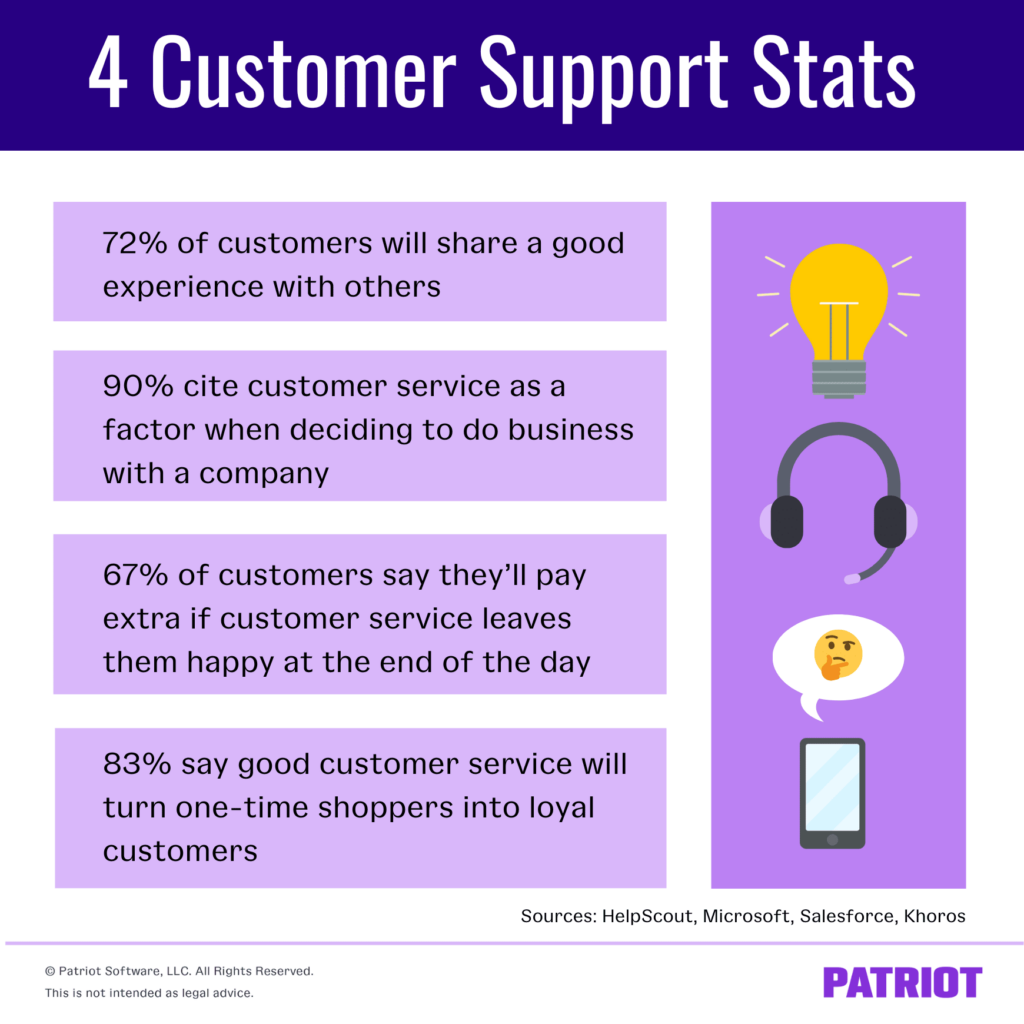You’ve probably been on hold with a customer support representative before. And, sadly, it may not have gone great. You aren’t alone. Thirty-three percent of callers report that being placed on hold is the most frustrating part of customer service. Calls to customer service can be long and complicated, and emotions can get hot. But while you may dread calling customer service, think about how your customers feel. Bad customer service may seem like a common occurrence, but good customer service can be priceless for your company.
The statistics don’t lie: 72% of customers will share a good customer service experience with others. And for 83%, good customer service is enough to turn one-time shoppers into loyal customers.
Read on to learn more about customer support and why it is so important to your business.
What is customer service?
Customer service is a general term that describes the many resources a company uses to improve the overall customer experience. Customer service agents operate at all stages of the customer lifecycle and their tasks can include:
- New customer onboarding
- Answering customer questions
- Helping with billing and delivery issues
- Collecting customer reviews and feedback
As a broad category, customer service includes customer support.
What is customer support?
Customer support is a form of customer service that specifically helps customers with any technical issues they may have when using your product or services. These tasks can include:
- Troubleshooting customer issues via email, live chat, or over the phone
- Helping with installation and/or maintenance of your product or services
- Helping with upgrades and disposal of products or services
- Providing input into product development based on customer feedback
There are more ways customer service and customer support can help your customers, but these short lists should get you started. Next, let’s cover why customer support is so important to your business.

Why is customer support so important to your business?
If you think about it from your customer’s perspective, it’s pretty obvious why customer support is important. Let’s say a customer recently bought a product from you they were initially excited about. Turns out, the product didn’t work out as intended, so they call your customer support team for help.
This is a fork in the road for you and your customer. But, this is where customer support is key. If things go right, you end up with a happy customer. If things go wrong, you may lose the customer entirely.
And if numbers are more your speed, you’re in luck. There are plenty of statistics that prove customer support leads to better retention of customers and more revenue for your business.
Here are five ways that customer support can help your business.
1. Customer retention = dependable customer spending
Retaining customers through on-point customer support is cheaper than acquiring new customers.
More importantly, repeat customers can become dependable shoppers. If a customer makes a second purchase, 53% of them will make a third.
2. Your customer support team is a brand ambassador
It’s a good idea to think of your customer support team as brand ambassadors—just as important as a good marketing team.
If your customers like their experience, they’ll repay you with loyalty. Ninety-five percent of customers cite customer service as essential for brand loyalty.
The good news keeps coming: If customers have a good experience with your company, 72% of them will tell six or more people about it.
3. Better customer service means more customer spending
Good customer support goes a long way. Sixty-seven percent of customers say they’ll even pay extra for products or services if customer service leaves them happy at the end of the day.
4. Bad customer reviews are contagious
Let’s face it: upset customers talk. A lot. if a good experience leads to six or more people hearing about it, word of a bad review gets around even more. Thirteen percent of unhappy customers will tell 15 or more people about their bad experience with your company.
5. Customer services teams know about customer experience
Customer services teams aren’t just there to help your customers—they help you as well. When connecting with the customer, service teams don’t only troubleshoot problems, but also learn how customers feel about your products and services.
Your customer support team can supply your sales team with valuable information on customer expectations and spending patterns, and they can also let you know about possible new products or services to offer.
OK, technically, this isn’t a statistic. But it is 100% true (there’s the stat!).
Want to impress your friends at a dinner party?
Get the latest small business news delivered straight to your inbox.
Subscribe to Email ListWhat type of customer support is right for your business?
Hopefully, you’re convinced that customer support is a valuable part of business. There are many ways to offer customer support in our digital age to your customers, including:
- Phone
- Live chat
- A “contact us” form
A phone center and live chat have some limitations—customers can’t call after business hours, and their business hours may be drastically different from yours. So, their window to call may be small. But, email and “contact us” forms offer a way for customers to get in touch with you no matter what time it is.
Here are some things to keep in mind when deciding which is the best way for customers to get in contact with you. According to one study, your customers already have preferences:
- 62% of your customers want to communicate via email
- 48% would prefer to use the phone
- 42% will use live chat
- 36% will use a “contact us” form
The good news is that you don’t have to limit yourself to one of these options. In fact, you can easily offer all of them. Make it as easy as possible for your customers to let you know how you’re doing. And, make sure you go the extra mile to let your customer support team know just how important they are to your business.
This is not intended as legal advice; for more information, please click here.
